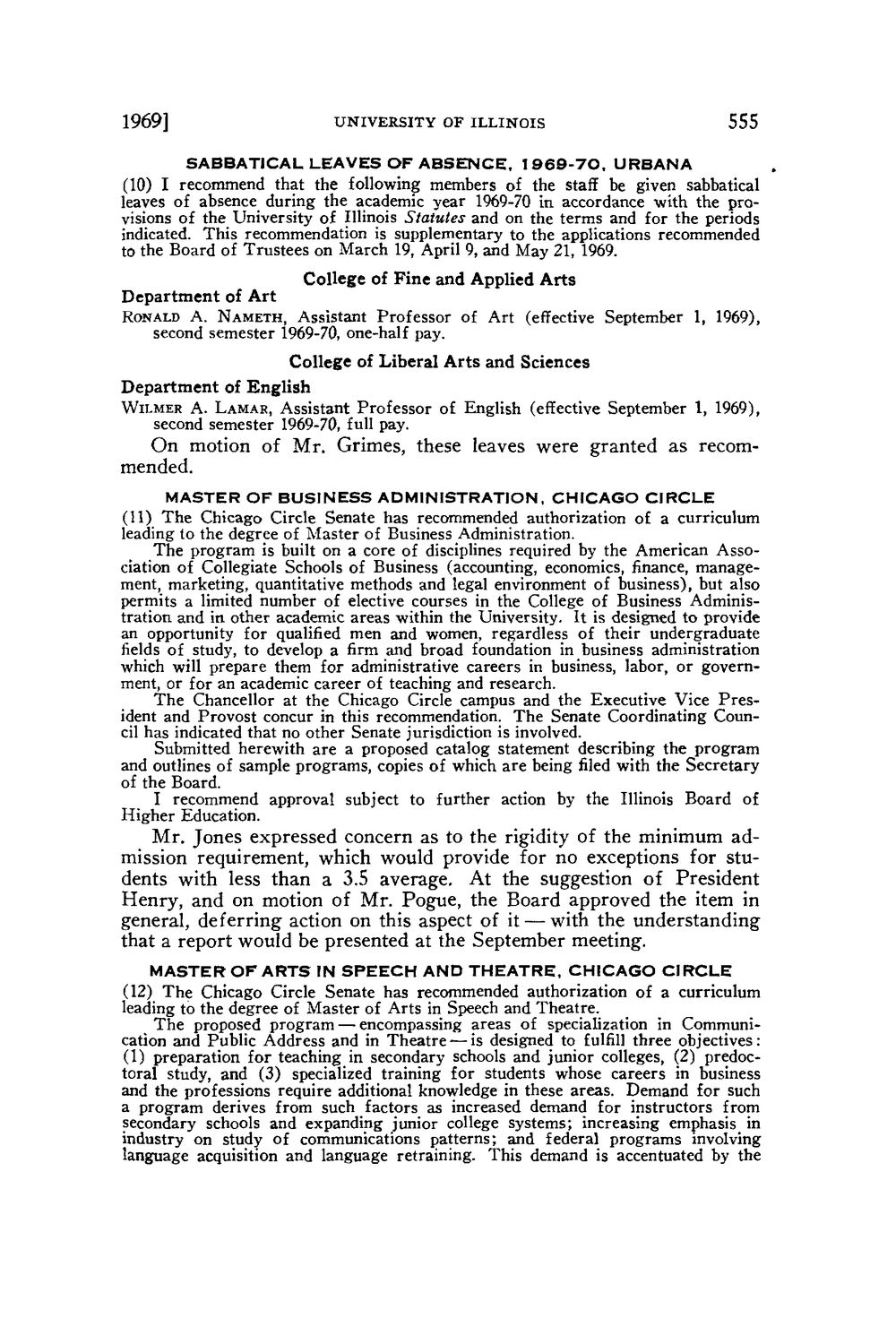| |
| |
Caption: Board of Trustees Minutes - 1970
This is a reduced-resolution page image for fast online browsing.

EXTRACTED TEXT FROM PAGE:
1969] UNIVERSITY OF ILLINOIS 555 SABBATICAL LEAVES O F A B S E N C E , 1 9 6 9 - 7 0 , URBAN A (10) I recommend that the following members of the staff be given sabbatical leaves of absence during the academic year 1969-70 in accordance with the provisions of the University of Illinois Statutes and on the terms and for the periods indicated. This recommendation is supplementary to the applications recommended to the Board of Trustees on March 19, April 9, and May 21, 1969. College of F i n e and Applied A r t s D e p a r t m e n t of A r t RONALD A. NAMETH, Assistant Professor of Art (effective September 1, 1969), second semester 1969-70, one-half pay. College of Liberal A r t s and Sciences D e p a r t m e n t of E n g l i s h WILMER A. LAMAS, Assistant Professor of English (effective September 1, 1969), second semester 1969-70, full pay. O n m o t i o n of M r . G r i m e s , t h e s e l e a v e s w e r e g r a n t e d a s r e c o m mended. MASTER O F B U S I N E S S ADMINISTRATION, CHICAGO C I R C L E (11) The Chicago Circle Senate has recommended authorization of a curriculum leading to the degree of Master of Business Administration. The program is built on a core of disciplines required by the American Association of Collegiate Schools of Business (accounting, economics, finance, management, marketing, quantitative methods and legal environment of business), but also permits a limited number of elective courses in the College of Business Administration and in other academic areas within the University. It is designed to provide an opportunity for qualified men and women, regardless of their undergraduate fields of study, to develop a firm and broad foundation in business administration which will prepare them for administrative careers in business, labor, or government, or for an academic career of teaching and research. The Chancellor at the Chicago Circle campus and the Executive Vice President and Provost concur in this recommendation. The Senate Coordinating Council has indicated that no other Senate jurisdiction is involved. Submitted herewith are a proposed catalog statement describing the program and outlines of sample programs, copies of which are being filed with the Secretary of the Board. I recommend approval subject to further action by the Illinois Board of Higher Education. M r . J o n e s e x p r e s s e d c o n c e r n a s t o t h e r i g i d i t y of t h e m i n i m u m a d m i s s i o n r e q u i r e m e n t , w h i c h w o u l d p r o v i d e f o r n o e x c e p t i o n s for s t u d e n t s w i t h less t h a n a 3.5 a v e r a g e . A t t h e s u g g e s t i o n o f P r e s i d e n t H e n r y , a n d o n m o t i o n of M r . P o g u e , t h e B o a r d a p p r o v e d t h e i t e m in g e n e r a l , d e f e r r i n g a c t i o n o n t h i s a s p e c t of it — w i t h t h e u n d e r s t a n d i n g that a r e p o r t w o u l d be presented at the S e p t e m b e r meeting. MASTER O F A R T S IN S P E E C H AND THEATRE, CHICAGO C I R C L E (12) The Chicago Circle Senate has recommended authorization of a curriculum leading to the degree of Master of Arts in Speech and Theatre. The proposed program — encompassing areas of specialization in Communication and Public Address and in Theatre — is designed to fulfill three objectives: (1) preparation for teaching in secondary schools and junior colleges, (2) predoctoral study, and (3) specialized training for students whose careers in business and the professions require additional knowledge in these areas. Demand for such a program derives from such factors as increased demand for instructors from secondary schools and expanding junior college systems; increasing emphasis in industry on study of communications patterns; and federal programs involving language acquisition and language retraining. This demand is accentuated by the
| |